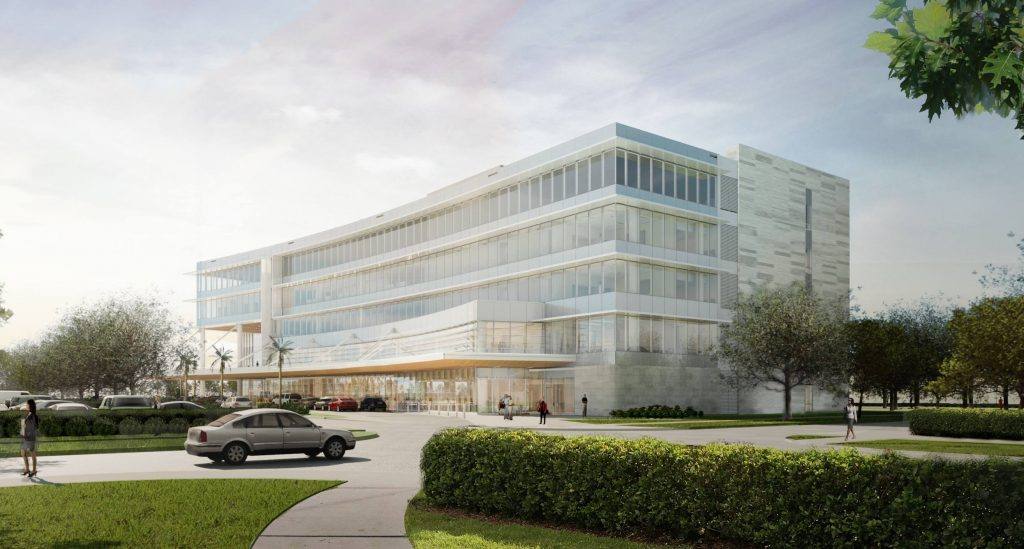-
Cancer
Mangurian Foundation donates $20 million to Mayo Clinic to name new medical building
 JACKSONVILLE, Fla. — Mayo Clinic’s Florida campus has received a $20 million gift from The Harry T. Mangurian Jr. Foundation in Fort Lauderdale, Florida, to support expansion projects and a new medical building for cancer and neurologic care. The building will be named in honor of Harry T. Mangurian and his wife, Dorothy Mangurian, and will be called the “Dorothy J. and Harry T. Mangurian Jr. Building.”
JACKSONVILLE, Fla. — Mayo Clinic’s Florida campus has received a $20 million gift from The Harry T. Mangurian Jr. Foundation in Fort Lauderdale, Florida, to support expansion projects and a new medical building for cancer and neurologic care. The building will be named in honor of Harry T. Mangurian and his wife, Dorothy Mangurian, and will be called the “Dorothy J. and Harry T. Mangurian Jr. Building.”
The naming unites key aspects of the Mangurians' life stories. Harry Mangurian died of leukemia in 2008. Dorothy Mangurian was diagnosed with Lewy body dementia, a neurological condition that can have features of Parkinson’s and Alzheimer’s diseases. She passed away in 2015.
“We greatly appreciate this gift from the Mangurian Foundation. It will have a lasting impact on Mayo Clinic’s efforts to deliver unparalleled care to patients who come to us with some very complex health issues,” says Gianrico Farrugia, M.D., vice president, Mayo Clinic, and CEO of Mayo Clinic in Florida. “We are extremely grateful to the Mangurian Foundation and are honored that the legacy of the Mangurians will continue to make a difference in the lives of our patients for many years to come.”
Mayo Clinic already has begun constructing the destination medical building that will provide integrated services needed for complex cancer, neurologic and neurosurgical care, and for patient-centered research. Initially rising five stories, the 190,000-square-foot building has the potential for seven more stories. The building is scheduled to open in late summer.
Features of the new building include:
- Two floors devoted to hematology and oncology care
The new space more than doubles the size of the Hematology and Oncology Department, and will be complemented by a 50 percent increase in staff. The number of clinical trials and immunotherapies also will increase. - Oncology Infusion Center
This area offers patients privacy and comfort. Also, there will be space for family members, a dedicated nourishment area and a patient library. - One floor devoted to neurology and neurosurgery
The new building also doubles the space for the Neurology and Neurosurgical departments and will support the hiring of 12 new neurologists and neurosurgeons. - Patient care enhancements
Patient care enhancements include an outdoor garden and meeting space for support groups and dietary options tailored to specific diseases. - Education enhancements
The building includes space designed specifically for Mayo Clinic’s education efforts and the training of residents and fellows. - Research
The building will have space to facilitate basic science research and for the delivery of early therapeutics and clinical trials.
Over the past two years, Mayo Clinic’s Florida campus has flourished with major construction and new staff to serve a fast-growing patient population, especially those who require complex medical care. During this time, Mayo Clinic has invested more than $300 million in construction projects and added over 1,000 new staff to become the premier destination medical center in the Southeast. Over the next five years, Mayo Clinic will continue to add staff to support the new Mangurian Building and other major expansion projects. Mayo’s Florida campus has more than 6,000 staff members and contributes nearly $2 billion annually to the Florida economy.
“We are pleased to provide this support to the Mayo Clinic as it not only indicates our continuing confidence in their overall mission, but also endorses the specific medical areas which will be served by the expansion project,” says Stephen G. Mehallis, president, The Harry T. Mangurian Jr. Foundation. “The naming of the building is a fitting tribute to the legacy of Mr. and Mrs. Mangurian.”
Previous gifts from the Mangurian Foundation have helped Mayo researchers advance the study of Lewy body dementia, a deadly disease that causes a progressive decline in mental and physical abilities. A gift of $5.75 million in 2015 created the Mayo Clinic Dorothy J. and Harry T. Mangurian Jr. Lewy Body Dementia Program. It also supported the brain bank on the Florida campus, which includes about 1,000 donated organs of deceased patients confirmed to have had Lewy body dementia.
The Mangurian gifts also have contributed to a first-ever genomewide association study that found new genetic risk factors for Lewy body dementia. Mayo Clinic researchers recently discovered a Lewy body dementia gene that runs in some families. They also identified a severe sleep disorder, in which patients act out their dreams, as a significant predictor of the disease 10 to 20 years in advance of other symptoms.
In total, the Mangurian Foundation has committed nearly $27 million to Mayo Clinic.
The late Harry T. Mangurian Jr. was a developer in Fort Lauderdale and Rochester, New York. He owned the NBA’s Boston Celtics and was an influential leader in thoroughbred horse racing, maintaining a breeding farm in Ocala, Florida.
###
About Mayo Clinic
Mayo Clinic is a nonprofit organization committed to clinical practice, education and research, providing expert, comprehensive care to everyone who needs healing. Learn more about Mayo Clinic. Visit the Mayo Clinic News Network.
Media contact:
- Kevin Punsky, Mayo Clinic Public Affairs, 904-953-0746, punsky.kevin@mayo.edu







